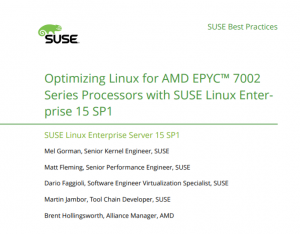Epic Performance with New Tuning Guide – SUSE Linux Enterprise Server on AMD EPYC* 7002 Series Processors
EPYC is AMD’s flagship mainstream server microprocessors and supports 1-way and 2-way multiprocessing. The first generation was originally announced back in May 2017 and replaced the previous Opteron server family with the introduction of the Zen microarchitecture for the mainstream market.

2nd Generation AMD EPYC™ Processors
With the second iteration of the EPYC processors, AMD has released a game-changing processor family for servers. Introduced to the market in August 2019, AMD EPYC™ 7002 Series Processors are based on the company’s Zen 2 architecture supporting up to 64 cores (128 threads) and 8 memory channels per socket. This sets a new standard for the modern data center.
2nd Generation AMD EPYC™ processors remain compatible with the existing workstation and server platforms, but bring significant feature and performance improvements, more memory capacity on standard SKUs, more cores, and better thermal efficiency than either the first generation EPYC predecessors or any competing processors. Also, EPYC’s original NUMA design has been heavily improved, increasing efficiency and removing potential bottlenecks in multi-socket configuration. Thus, they help turbocharge application performance, transform datacenter operations, and help secure mission-critical data. Driven by the AMD Infinity Architecture, the AMD EPYC™ 7002 Series Processors are the first x86-architecture server processors based on 7nm process technology, a hybrid, multi-die architecture, PCIe Gen4 I/O, and an embedded security architecture.
Collecting World Records
AMD EPYC™ 7002 Series Processors to date have set more than 140 world records for High Performance Computing, Rendering, Floating Point Performance, Integer Performance, Energy Efficiency and more across major industry benchmarks including SPEC CPU® 2017 , TPC®7, and VMware® VMmark® 3.18. Many of these world records were achieved with SUSE Linux Enterprise Server as the operating system of choice running on the 2nd Gen AMD EPYC processors.
New Performance Tuning Guide
If you now want to understand how to obtain world record performance for your business, we recently published a new SUSE Best Practices tuning guide that helps you to get the best out of SUSE Linux Enterprise Server running on AMD EPYC™ 7002 Series Processors. This document, written by my colleagues Mel Gorman, Matt Fleming, Dario Faggioli, and Martin Jambor (in close collaboration with their peers at AMD), provides an overview of how some computational-intensive workloads can be tuned on SUSE Linux Enterprise Server 15 SP1.

After providing an introduction to the architecture and topology of the AMD EPYC™ 7002 Series Processors, the guide covers topics such as memory and CPU binding, high-performance storage devices and interrupt affinity, automatic NUMA balancing, power management, security mitigations and hardware-based profiling.
The second part of the document describes how to use SUSE Linux Enterprise Server and the 2nd Generation AMD EPYC™ Processors for virtualization. In detail explained are the allocation of resources and the tuning of the host as well as of the virtual machines. And – very important – the guide includes quite a few performance test scenarios and their results.

Want to learn more? Read the entire tuning guide at our documentation web page – this new paper will provide you with a myriad of useful and valuable information and insight on how to tune performance of SUSE Linux Enterprise Server 15 SP1 on AMD EPYC™ 7002 Series Processors.
By the way, on our documentation web pages you can also find many more SUSE Best Practices documents for a variety of topics. And if you want to write / contribute to a SUSE Best Practices paper yourself, write an email to the SUSE Documentation team at doc-team@suse.com or contact me directly (meike.chabowski@suse.com). Always happy to help!
Disclaimer: The text at hand has been written by a non-native English speaker. If you find typos or language mistakes, please send them to me (meike.chabowski@suse.com) – or if you like them, just keep them and feed them. ![]()
Related Articles
Apr 15th, 2024
Install your HPC Cluster with Warewulf
Jul 20th, 2022
What is a kernel thread?
Jun 29th, 2023
No comments yet